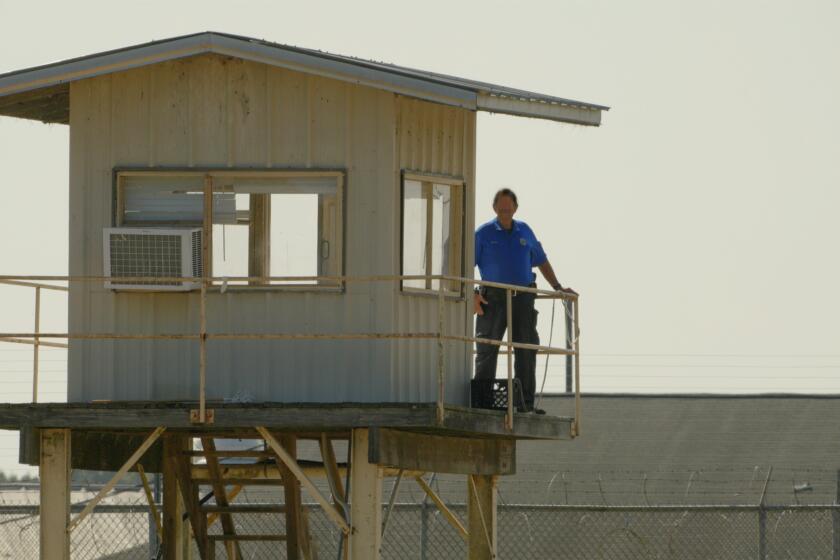Locarno: What’s a nice Swiss film festival doing in L.A.?
- Share via
It was the memory of the Cannes Critics Week hosted by Filmex at the Los Angeles County Museum of Art in November 1974 that inspired critic and programmer Robert Koehler to do something similar. As a UCLA freshman, he covered the festival for the Daily Bruin.
“I’ve been waiting since then for someone to import a program from a major, world-class festival to the city. It was way overdue,” says Koehler.
He noticed that Jordan Cronk, a fellow critic and founder of Acropolis Cinema, was screening many titles that debuted at Switzerland’s Locarno Festival, an international platform for exciting and outré cinema for seven decades. Koehler thought to take the Acropolis mission of screening experimental cinema titles that have yet to find L.A. theatrical distribution and program an entire weekend focused on Locarno’s most recent edition. “The only rule we would follow was that they were Los Angeles premieres.”
With the blessing of Locarno artistic director Carlo Chatrian and programmer Mark Peranson, and in partnership with the Swiss Consulate General, the Locarno in Los Angeles Film Festival was born. The inaugural edition includes 10 feature films, two panel discussions with local critics, programmers and filmmakers, and a shorts program starting Friday at the Downtown Independent.
The Locarno Festival debuted in August of 1946 with a screening of Giacomo Gentilomo’s “O sole mio” on the lawn of the Grand Hotel. Located in the Italian-speaking southern region of Switzerland, the festival is known for its outdoor screenings, held since 1971 at the Piazza Grande, with one of the largest open-air screens in the world and capacity for 8,000 spectators.
Another defining feature of Locarno is its avant-garde programming. It’s provided the international debuts of such filmmakers as as Milos Forman, Mike Leigh, Béla Tarr, Abbas Kiarostami, Fatih Akin, Jim Jarmusch and Gus Van Sant. With 12 different sections, the festival highlights the most daring and original global cinema. The top prize is the Golden Leopard, with special jury prizes going to “Filmmakers of the Present” and “Leopards of Tomorrow.”
The Locarno in L.A. program includes nonfiction and narrative films, from slow cinema such as “All the Cities of the North” to more genre-oriented fare like the violent Japanese film “Destruction Babies.” Cronk describes Yuri Ancarani’s nonfiction film “The Challenge,” a visually and aurally opulent exploration of Qatari falconry, as their “crowd-pleaser.” For Cronk, it always comes down to the question of access. “The fact that you wouldn’t be able to see [these films] otherwise,” he says.
The centerpiece film on Saturday night is Theo Anthony’s debut documentary feature, “Rat Film.” This bracing, hallucinatory and daring film mixes formal experimentation with trenchant social commentary about the history of Baltimore, red-lining and rats as a symbol for racial and class inequality. Anthony will appear in person with the film and is participating in Sunday’s panel discussion, “Framing a Festival: How Locarno Presents International Cinema.”
The closing night film, “Scarred Hearts,” from “Aferim!” director Radu Jude follows the painful but surprisingly sweet and often funny experiences of a young man confined to a body cast in a sanatorium in the early 20th century. Cronk appreciates that Jude, a Romanian director, has been working outside of his nation’s new wave movement, making period pieces that are “all very different in style and tone — the last one was a comedy, this one has humor as well, but it’s much more serene.”.
Other highlights from the program include German filmmaker Angela Schanelec’s “The Dreamed Path,” which Cronk anticipates will be “one of the more polarizing films, it’s very esoteric and opaque.” The film experiments with art-house techniques while telling the intertwining stories of two couples experiencing alternate realities. Cronk describes Schanelec’s work as “very elliptical” and says “she doesn’t really have any contemporaries in that way — I think it will be interesting to see how people react to that one.”
Another audacious film on the schedule is Eduardo Williams’ “The Human Surge.” Cronk says that even if audiences don’t like the film, it will be unlike anything they’ve ever seen. “Some of the films are going to go over really well, some are going to challenge people.”
It is all a part of the cinephile culture Koehler and Cronk are seeking to establish with Locarno in Los Angeles. “As long as it sparks some conversation, that’s one of the goals,” Cronk says, “to have people hang around all weekend and talk about the films.”
-------------
Locarno in Los Angeles Film Festival
Where: Downtown Independent, 251 S. Main St., Los Angeles
When: April 21-23 and 25
Tickets: Individual screenings $12; passes, $45-$90
Info: www.locarnoinlosangeles.com
See the most-read stories in Entertainment this hour »
Movie Trailers
More to Read
Only good movies
Get the Indie Focus newsletter, Mark Olsen's weekly guide to the world of cinema.
You may occasionally receive promotional content from the Los Angeles Times.









